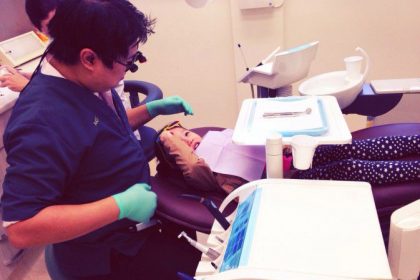
Building Trust: Expert Techniques for Your Child’s First Dental Visit
In part 1 and 2 of our series on your child’s first dental visit, we talked about the right time to take your child to the dentist for the first time and how to best prepare your child for this. Today we discuss techniques dentists use to build trust with their new little patients.
We, as dentists, treat both young and old patients. Upon entering the clinic, we quickly notice significant differences. Adult patients have distinct needs compared to younger ones.
Dentists use many “tricks of the trade” to build trust with young patients. Here are some common techniques we find useful at Grange Family Dental. Our experience as family dentists has proven these methods effective. Following these rules ensures a child leaves our practice feeling more positive. They feel more comfortable about dental visits than before.
1. We never lie to a child
No long term relationship would work if it’s started on a lie. We never ever lie to the child even if it’s to achieve a short term result. There are many ways to get your child to cooperate with the treatment, lying to them is the worst option. It will only work once and will destroy their ability to trust any health professionals in the long run.
2. We will always try to explain in simple terms what we are going to do
Even if administering a local anesthetic is necessary, it’s crucial to inform children beforehand. They may dislike it, but transparency is key. Surprises during the procedure can cause panic. Children instinctively struggle when faced with the unexpected. Imagine their reaction to an unmentioned syringe. Such a surprise can instill a deep-seated fear of every dental move, even painless ones.
3. Always be ready to stop
During early trust-building, your child might question every sensation they find threatening. A patient dentist must pause and clarify using simple, child-friendly analogies. This approach helps build long-term trust. Forcing a child beyond their comfort zone only sustains their fear of the dentist. Consequently, trust fails to develop over time.
4. Bribery is ok – sometimes
When older kids fear the unknown, we occasionally suggest parents offer a small “bribe”. The dentist must confidently fulfill the promise, like saying, “this won’t hurt at all, and if you stay still, we’ll give you a little gift”. Don’t offer bribes for everything; it’s a trust-building tool, not a constant trade-off. Just as you wouldn’t reward your child every time they behave well at home, you shouldn’t do so at the dentist’s office.
5. Create a child friendly environment
If your child walks through our front door and all they can see are toys, iPad and other things that they wish they had at home, you have just won half the battle. Straight away, your child will not fight you when you say “let’s go to the dentist”. We have had many appointments where the promise of been “next on the iPad” helped overcome any fear they had with meeting the dentist for the first time.
Ultimately, it’s like parenting – if you want to foster a long term healthy relationship with your child, then positive reinforcement is always the first tool of choice. The pointers we listed above are just a snapshot of some key factors in fostering a child’s confidence in their dentist, the more critical part is still in the application of the skills.
A good dentist should be prepared to spend the time to foster a relationship with your child, pay attention to their body language so they know when something has past their comfort zone and stop immediately.








